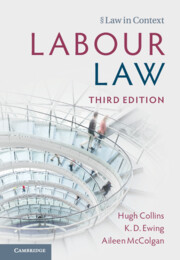Book contents
- Frontmatter
- Contents
- Preface
- Table of Cases
- Table of Statutes
- Table of Statutory Instruments
- Table of EU Instruments
- Table of ILO Instruments
- Table of Other International Instruments
- Abbreviations
- Part I Introduction
- Part II The Contract of Employment
- Part III Statutory Regulation of the Employment Relationship
- 7 Wages
- 8 Working Time
- 9 Equality
- 10 Work/Life Balance
- 11 Civil Liberties at Work
- Part IV Collective Labour Rights
- Part V Termination of Employment
- Index
7 - Wages
from Part III - Statutory Regulation of the Employment Relationship
Published online by Cambridge University Press: 02 October 2025
- Frontmatter
- Contents
- Preface
- Table of Cases
- Table of Statutes
- Table of Statutory Instruments
- Table of EU Instruments
- Table of ILO Instruments
- Table of Other International Instruments
- Abbreviations
- Part I Introduction
- Part II The Contract of Employment
- Part III Statutory Regulation of the Employment Relationship
- 7 Wages
- 8 Working Time
- 9 Equality
- 10 Work/Life Balance
- 11 Civil Liberties at Work
- Part IV Collective Labour Rights
- Part V Termination of Employment
- Index
Summary
The common law permits employers to fix the wages payable under the contract of employment and also upholds a broad principle of no work–no pay. Statute protects employees against deductions from their wages that are not authorised by the terms of their contract. Subject to the express terms of the contract, in some circumstances employers may be under a duty to provide work so that employees can earn a living. These rules embrace a principle of mutuality that protects the expectation of the employer that work will be performed and of the employee that work will be remunerated. The National Minimum Wage sets a floor on wages for all workers. The chapter describes the method of assessing whether the minimum wage is paid in various kinds of jobs. It concludes by assessing the various types of enforcement mechanisms, including HMRC inspectors, penalties and civil claims, and assesses the effectiveness of the law.
Keywords
Information
- Type
- Chapter
- Information
- Labour Law , pp. 245 - 283Publisher: Cambridge University PressPrint publication year: 2025
Accessibility standard: WCAG 2.2 AAA
Content Navigation
Allows you to navigate directly to chapters, sections, or non‐text items through a linked table of contents, reducing the need for extensive scrolling.
Provides an interactive index, letting you go straight to where a term or subject appears in the text without manual searching.
Reading Order & Textual Equivalents
You will encounter all content (including footnotes, captions, etc.) in a clear, sequential flow, making it easier to follow with assistive tools like screen readers.
You get concise descriptions (for images, charts, or media clips), ensuring you do not miss crucial information when visual or audio elements are not accessible.
You can access graphs or charts in a text or tabular format, so you are not excluded if you cannot process visual displays.
Visual Accessibility
You will still understand key ideas or prompts without relying solely on colour, which is especially helpful if you have colour vision deficiencies.
You benefit from high‐contrast text, which improves legibility if you have low vision or if you are reading in less‐than‐ideal lighting conditions.
